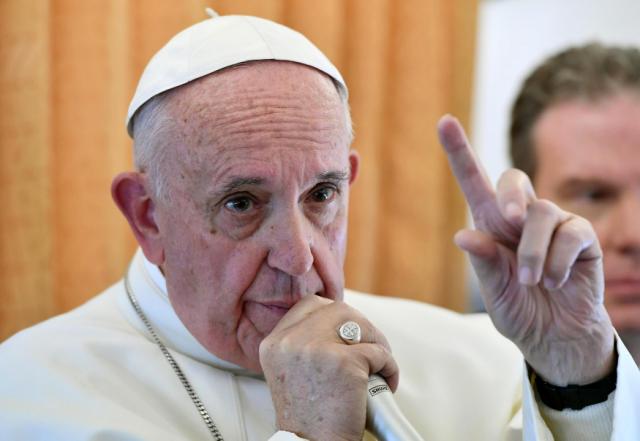Pope Francis denied Tuesday the possibility of women ever becoming priests, citing a decision made by one of his predecessors, Reuters reported. The pope, known as an advocate for Church reform on certain major issues, expressed his viewpoint during a press conference on the papal plane as he returned to Rome from Sweden.
A female Swedish reporter mentioned to the pontiff that the female head of the Lutheran Church had welcomed him into Sweden and asked him if he believed the Catholic Church would allow women to be ordained into the priesthood.
“St. Pope John Paul II had the last clear word on this and it stands, this stands,” Francis told the reporter.
“But forever, forever? Never, never?” she followed up.
“If we read carefully the declaration by St. John Paul II, it is going in that direction,” Francis answered.
Francis referred to a 1994 document by John Paul entitled “Apostolic Letter, Ordinatio Sacerdotalis, of John Paul II to the Bishops of the Catholic Church on Reserving Priestly Ordination to Men Alone.” The late Catholic leader precludes the possibility of women becoming priests and references a number of examples from the Church’s theological tradition to reinforce this point of view.
The featured evidence predominantly points to the belief that the ways of Jesus Christ serve as the basis for the Church’s doctrine. The declaration states that priests are the natural successors to the male apostles, of which Jesus only chose males. It goes on to say that this does not mean women are held to any lower standard in the eyes of the Church because Jesus’ mother, revered as a central character in the Church, was never ordained as a priest either.
“The fact that the Blessed Virgin Mary, Mother of God and Mother of the Church, received neither the mission proper to the Apostles nor the ministerial priesthood clearly shows that the non-admission of women to priestly ordination cannot mean that women are of lesser dignity, nor can it be construed as discrimination against them. Rather, it is to be seen as the faithful observance of a plan to be ascribed to the wisdom of the Lord of the universe,” John Paul wrote.
Francis has taken non-traditional stances on various issues in the past. He became pope in 2013 after his predecessor, Pope Benedict XVI resigned from the position. Francis made shockwaves early on in his tenure when he declared, “If someone is gay and searches for the Lord and has good will, who am I to judge?” Catholic leaders have traditionally condemned homosexuality. He has also held sympathetic stances toward leftist ideologies and emphasized a more compassionate interpretationof the faith.
Though the priesthood remains off limits, Francis established in August a commission to research the possibility of allowing women to become deacons. Deacons cannot celebrate Mass, but are permitted to baptize, conduct wake and funeral services and preach in the n














